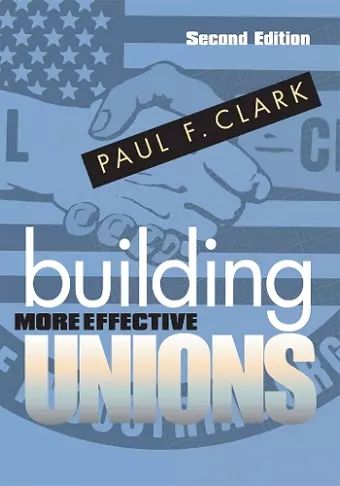Building More Effective Unions
Format:Paperback
Publisher:Cornell University Press
Published:10th Mar '09
Currently unavailable, and unfortunately no date known when it will be back

Employers have long turned to behavioral science for guidance on making their organizations more effective. Labor scholar Paul F. Clark believes union leaders should also take advantage of the valuable discoveries made in this field, and he offers a straightforward account of how they can do so.
Much of the behavioral science research relevant to unions relies on complex statistical analyses and is disseminated through scholarly journals. This clearly written book makes the findings of behavioral science accessible to those committed to building a stronger labor movement. It describes behavioral science's understanding of such topics as organizational commitment and member participation and suggests how this knowledge can best be applied to unions.
Building More Effective Unions offers practical strategies unions can use to their advantage in a number of areas, including:
-Union participation
-Organization and retention
-Union orientation and socialization
-Political action
-Grievance procedures
-Information and communications
-Union image-building
-Union culture
-Union leadership
The book features examples of how unions and their leaders have benefited from putting the principles of behavioral science into practice.
"Building More Effective Unions provides some very useful frameworks for looking at factors that motivate workers' participation, and it offers some very practical suggestions about how organizational environments can be influenced."—Journal of Industrial Relations (reviewing the first edition)
"Building More Effective Unions provides us with a splendid account of the multiple facets of unions' activities and opportunities for union restructuring."—Transfer (reviewing the first edition)
"Building More Effective Unions succeeds at linking behavioral research findings to the practical problem of increasing participation. It will therefore prove useful to academics studying this pervasive problem and union practitioners working to improve their organizations."—Industrial and Labor Relations Review (reviewing the first edition)
"Paul Clark has taken years of behavioral science studies about unions and applied them to the modern-day challenges faced by organized labor. While I was the manager for the UniServ Program at the National Education Association (NEA) the book was an integral part of the training we provided for newly hired UniServ directors. It is an excellent resource on organizing issues, retaining members, building proper union culture, political action communication, and grievance procedures."—George Apaliski, National Education Association
"Building More Effective Unions is full of first-rate, evidence-based, practical information on how to engage members in ways that build greater commitment and loyalty to the union. Every union would benefit from the ideas in this excellent book."—Mary Lehman MacDonald, Director, AFT Healthcare
"I use the Paul Clark book every chance I get. It is an excellent account of what unions are doing to transform themselves. His approach delights students from various unions and backgrounds. I have used the book in over fifty courses and sections and will continue to use it often."—Greg Giebel, First Provost, National Labor College
"We use Paul Clark's Building More Effective Unions as the text in our Member Mobilization Course during our Business Managers Leadership Academy. Paul Clark offers a lot of practical and commonsense advice for union officials who are looking for ways to get members interested and involved in their unions. LIUNA is committed to improving member involvement in our union, and we use Building More Effective Unions to teach techniques that work."—James M. Warren, Director, LIUNA (Laborers) Education Department
ISBN: 9780801475191
Dimensions: 254mm x 178mm x 12mm
Weight: 454g
230 pages
2nd New edition